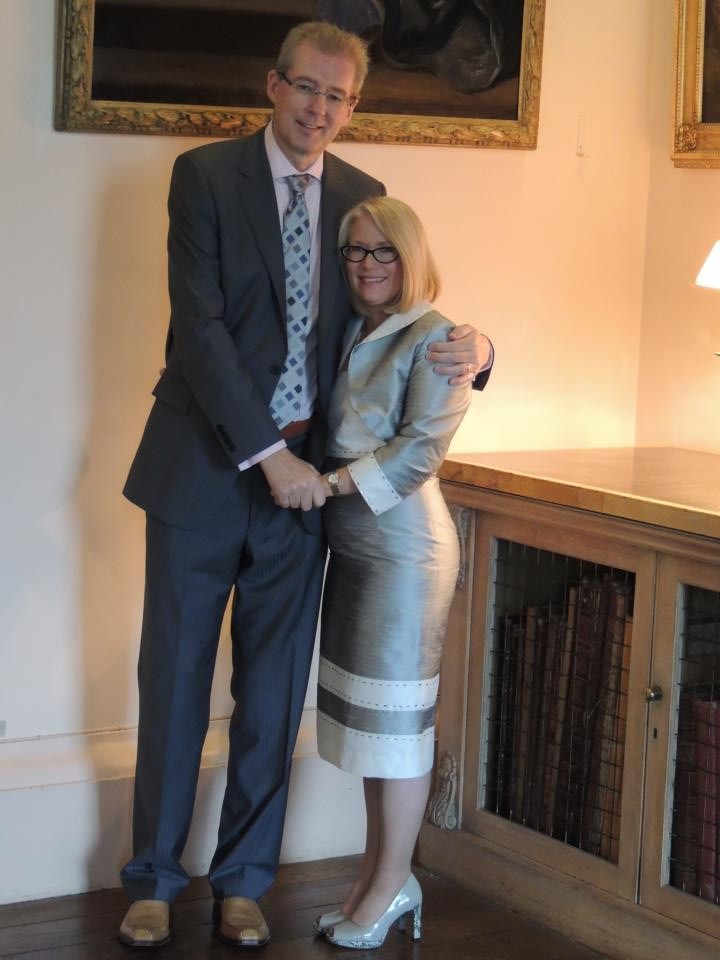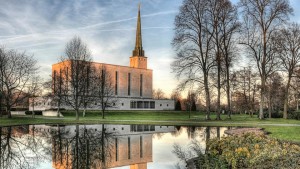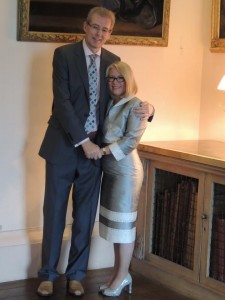I couldn’t imagine not having family and friends at a wedding. For many UK members the icing on the cake is the sealing in the temple, but feel wonderful that all family members whether LDS or not can enjoy and take part in a civil ceremony !
For me, it was lovely having all those people in our life that mean a lot to us, being able to share in the blessing and union of my self and my husband, seeing us get married and then enjoying and sharing a wonderful reception with family and friends that had travelled far and wide to be with us. Our day was wonderful and we are celebrating 28 years of marriage this year.
A few weeks ago we were able to watch our friends’ daughter marry her American LDS boyfriend here in England. The groom’s family came over to share their day with them and enjoy English hospitality at its best. They were married in an LDS chapel and then the reception was held at one of our leading historical houses. The location was fabulous and the Americans thought the day was fantastic with all the family







Is part of this post missing? It ends rather abruptly.
Sharon said all that needed to be said – it is wonderful the way it happens in the UK. They get to have their cake and eat it too. Why can’t Americans?
Good job Sharon, thanks for sharing with us.
Our son’s and daughter’s marriages are the culmination of years of so much sacrifice and love. When the church tells non-member American parents that none of that makes them worthy to witness their daughter’s and son’s marriages, everybody suffers — but mostly the church.
I agree, Sharon. Being born and brought up in the UK it had never occurred to me that I would not be able to take part in the day and witness the exchange of wedding vows of any of my children. Two of my sons were married in LDS chapels in England where friends and family could be present to share in celebrating their special days. Their mother and I had been married in this fashion in the 1970s and one of the most amazing things to us about that whole day was that three hundred people wanted to share the day with us. These people were not, as the cynical might suspect, freeloading members of the congregation, but mostly family members and our non-member friends from all our circles of activity. It turned out to be one of the most important aspects of the day and made us feel very, very special. I don’t think our LDS chapel had ever seen “standing room only” before.
Then, following his mission and the obligatory post-mission visit to his ex-companions in the USA, another of my sons proposed to a woman from Utah. We found her to be a lovely person and her family were very welcoming when our Mormon-sized family made the ten-thousand mile round trip to attend the wedding. Certain cultural assumptions were made or overlooked and my son had not realised straight away, but eventually discovered, that there would be no wedding that his father and three of his siblings would be able to attend since the “wedding” had to take place in the secrecy of a Mormon temple. However much Mormons protest that it is “sacred not secret” hidden stuff is, and always will be, “secret” to outsiders. At great expense he booked a sit-down meal for about fifty people in a restaurant near the temple. He hired the function room of the restaurant for his bishop to perform a “ring ceremony”. His in-laws just didn’t seem to get the cultural significance for us Brits of being able to share and witness the exchange of vows at a “real” wedding. I realise, to my embarrassment and shame that my wife and I had made a similar error years earlier when we had failed to take into account the cultural importance of alcohol when our eldest son married a Scot whose family had no connections with the LDS church. This ring ceremony was clearly seen as a sop to incoming unenlightened and apostate foreigners by the temple recommend-carrying believers. Maybe it was just me being overly sensitive, but there appeared to be a degree of smugness surrounding this gesture to inclusivity. After the meal we went into the small function room where the bishop improvised a little speech about about the infinite nature of circles and wedding rings. My son was allowed to kiss his wife and that was it. Later in the day the real wedding reception took place in the cultural hall of the chapel. This was where family and friends were allowed to mingle. It had been a long and tiring few days for us all. For days beforehand we had driven around the Salt Lake hinterlands picking up huge plastic replica Roman pillars, plastic grapevines and yards of floaty fabric to help create some kind of atmosphere in the traditionally bare cultural hall aesthetic. From my perspective far more importance had been attached to these pillars than to any other aspect of the wedding. I found all this confusing, alienating and fascinating at the same time. I asked the question, but never did receive a satisfactory answer, as to why so many people kept huge, plastic, replica Roman pillars in their garages. Did all Americans have these stashed away somewhere or was it just Mormons? Was it, perhaps, just Mormons in Utah?
The party was fun. We greeted, smiled, talked and we even knew some of the people who attended. We ate delicious and lovingly prepared buffet food. I think it was probably the last time my wife and I danced together before we divorced. We found a little corner where we could indulge ourselves in improvising our favourite French schottische moves that we had long ago discovered to be our preferred method of moving to pop music. Our kids understood, smiled indulgently and ignored us. The natives seemed vaguely curious, but not curious enough to ask.
However, even with all this joy, festivity and bemusement, what sticks in my mind and in my throat more than anything else was the sadness of not being able to witness the exchange of vows at the wedding. My grown-up and teenaged children and I were left at the home of the in-laws with what seemed like hundreds of babies and children we had never before met and who didn’t know us. It was somehow assumed that we would be babysitters in chief. In the UK I have to go through scrutiny by the Criminal Records Bureau to be able to do my normal work with even a fraction of the number of children that were present that day. Strangely no one asked if I were competent to be left in charge of their children. The silly thought did cross my mind that it was because these people were so prolific they wouldn’t miss a few if I turned out to be an child-hating, axe-wielding murderer.
At some appointed hour we were to make the short journey to the temple where we would be allowed to hang around outdoors until we were called to pose for photographs. I bit my tongue. It was not my day. It was never about me, but it hurt. Why did it hurt so much?
That was not the end. Years later, someone on Facebook shared the petition that was being submitted to encourage the Church to allow civil marriages prior to temple weddings without the penalty of having to wait a year before they could get married in the temple. Someone had obviously realised this was actually normal and what happens in most of the rest of the world. My ex-wife and I, my other sons, like so many others, had enjoyed our weddings in a chapel open to anyone we cared to invite and from where we made our way to the temple for the Mormon add-on of a temple marriage and sealing. It still struck me as very cruel that LDS families in Utah and maybe other places were denied this joy and were sifted for eligibility to attend family celebrations by their degree of adherence to Mormon rules. I shared the petition on my Facebook wall and alluded to my own story. Then family war broke out. My post was visible to everyone on my “friends” list. I had written my contribution very carefully, so as not to blame my son and his wife. It was not their fault. My disagreement was with LDS custom and practice and by implication LDS church leadership. However some people seem to work hard at taking offence. One of my excommunicated LDS children leapt to what he saw as his brother’s defence, telling me that it was my “choice” not to attend the wedding. I could have attended if I really wanted to. All I needed to have done was obey LDS rules … I shan’t go into the contortions this would have involved, but having been in a very happy same-sex relationship of several years’ duration One might begin to have an inkling. While I was pleased to note inter-sibling loyalty I was taken aback by the ferocity and tenacity of the attack, which gradually drew in other family members, who proved that they also had not read my comments and arguments. Some interesting points were raised in this exchange that signposted LDS mind-control. My real friends who did read what I wrote were shocked and called me to ask if I were okay. It all blew up very quickly and when I saw that “further enlightenment and knowledge” were not contributing to the discussion I deleted the thread.
From what I have gleaned from this story LDS members do not see any problem with excluding family members from weddings. We “choose” whether to obey the rules. This is the same in any gang or club apparently. In LDS Utah, obedience is a requirement for attending family weddings. My son in the USA explained his view that he felt this was healthy. He would rather live in a country where religious views are “respected”. He hoped the church would one day be accorded the same “respect” in England. Were that ever to become a prospect I would fight it very strongly and it would join the list of causes for which I am prepared to take to the streets in protest or solidarity.
When it became clear to me that I could not attend the wedding I discussed with my wife whether it would be better for me to stay home and save the money we didn’t have that we were going to have to find for going to the USA. She convinced me that this could have bad long term consequences and I accepted her point. When I brought up in the discussion that I had considered this as an option it was my son who pointed out that I was somehow making the ceremony more important than being there to support him for his wedding. By this time I was thoroughly confused. Apparently me being in the vicinity was enough for him. This got worse. Over this divisive issue battle lines were drawn and he cut off communication with me for a couple of years stating that I had not taken an interest in anything he or his family had done since the wedding. Perceptions may be everything at times, but a rational look at the evidence would have proven otherwise.
I am glad to say that, following the settlement of my late father’s estate I had been bequeathed enough money to afford a short trip to the USA. I visited my son and we had a great time together. I met my four grandchildren for the first time and his wife is as lovely as ever she was. I am very proud of him and love him dearly. Our relationship is back to being a good one despite the best efforts of the Church of Jesus Christ of Latter-day Saints.
Excluding family and friends from family celebrations is not good practice for an organisation that claims to be all about family and that takes such pains over its attempts to boost its membership. From the point of view of those of us who have been caught up in this completely unnecessary dogma it is very cruel and can cause lasting schisms in families. I have no wish to deny Mormons the right to conduct their masonic temple rites if they think that is how they are supposed to behave, but many of us are left cold and out in the cold by the leadership’s arrogance and exclusivity.
Lovely post, Sharon. Thanks for sharing your story. This whole series has been eye-opening for me. Among my three married children (all wed in Utah via temple sealings) one wedding had pain associated with it because the groom’s family could not attend the temple sealing. It sounds like there is a natural cultural expectation elsewhere in the world for a civil ceremony – which includes everyone – then a more private sealing ordinance – which appropriately includes fewer attendees. No hassle, no fuss, just the way it’s done. I hope we can move toward that in the states. It just makes sense.
Thanks again and congratulations on 28 years!
Growing up in Britain in the church, and going through the youth program, I was so glad not to live in the US, and so grateful that we get to have a wedding everyone can attend, followed by a sealing. I still feel that way now. I had understood that non-TR-holding adults would be excluded, that was abhorrant enough, but I certainly hadn’t taken on board that younger siblings would also be excluded (though I guess I should have done, since they don’t attend the sealing).
My husband and I married in Britain and were sealed in the London Temple on the same day. My husband’s non-member parents were able to attend, having flown half-way round the world to do so.
To do thing any other way just strikes me as being so divisive and damaging to families. Families we claim are the most important thing.
I served in the United States Air Force and was stationed in England from 1974 to 1977. I became a member of the Church of Jesus Christ of Latter Day Saints in December of 1974. I do not know what the legal status of Mormon temple marriages are currently. However, the reason there was a non temple wedding, usually on a Friday, followed by a temple sealing on a Saturday was due to the fact that temple marriages/sealings were not recognized by the British government.
Therefore, couples wanting a “temple marriage” would be married in a civil ceremony by a government official. Then, the next day, usually a Saturday, the couple would travel to the London Temple and be sealed. The marriage was not consumated until after the temple sealing.
Had the British government recognized Mormon sealings as legal and valid, Temple sealings would have taken place just as they did in Utah.
Would be interested to hear if the British government has changed its policies concerning temple marriages.